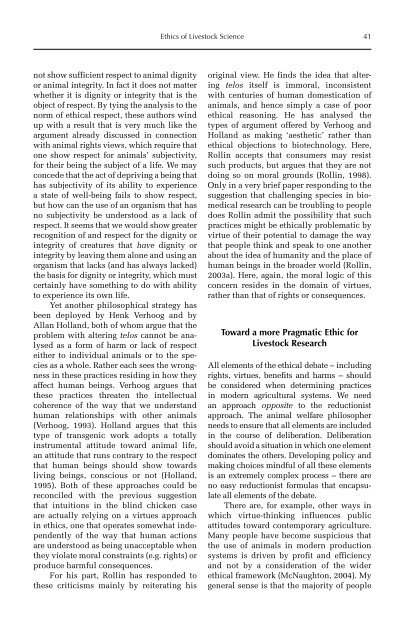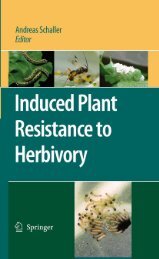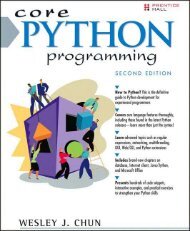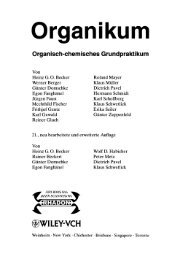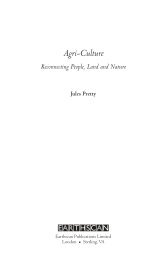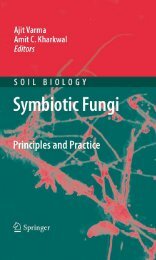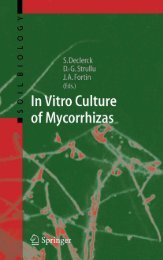Redesigning Animal Agriculture
Redesigning Animal Agriculture
Redesigning Animal Agriculture
You also want an ePaper? Increase the reach of your titles
YUMPU automatically turns print PDFs into web optimized ePapers that Google loves.
not show sufficient respect to animal dignity<br />
or animal integrity. In fact it does not matter<br />
whether it is dignity or integrity that is the<br />
object of respect. By tying the analysis to the<br />
norm of ethical respect, these authors wind<br />
up with a result that is very much like the<br />
argument already discussed in connection<br />
with animal rights views, which require that<br />
one show respect for animals’ subjectivity,<br />
for their being the subject of a life. We may<br />
concede that the act of depriving a being that<br />
has subjectivity of its ability to experience<br />
a state of well-being fails to show respect,<br />
but how can the use of an organism that has<br />
no subjectivity be understood as a lack of<br />
respect. It seems that we would show greater<br />
recognition of and respect for the dignity or<br />
integrity of creatures that have dignity or<br />
integrity by leaving them alone and using an<br />
organism that lacks (and has always lacked)<br />
the basis for dignity or integrity, which must<br />
certainly have something to do with ability<br />
to experience its own life.<br />
Yet another philosophical strategy has<br />
been deployed by Henk Verhoog and by<br />
Allan Holland, both of whom argue that the<br />
problem with altering telos cannot be analysed<br />
as a form of harm or lack of respect<br />
either to individual animals or to the species<br />
as a whole. Rather each sees the wrongness<br />
in these practices residing in how they<br />
affect human beings. Verhoog argues that<br />
these practices threaten the intellectual<br />
coherence of the way that we understand<br />
human relationships with other animals<br />
(Verhoog, 1993). Holland argues that this<br />
type of transgenic work adopts a totally<br />
instrumental attitude toward animal life,<br />
an attitude that runs contrary to the respect<br />
that human beings should show towards<br />
living beings, conscious or not (Holland,<br />
1995). Both of these approaches could be<br />
reconciled with the previous suggestion<br />
that intuitions in the blind chicken case<br />
are actually relying on a virtues approach<br />
in ethics, one that operates somewhat independently<br />
of the way that human actions<br />
are understood as being unacceptable when<br />
they violate moral constraints (e.g. rights) or<br />
produce harmful consequences.<br />
For his part, Rollin has responded to<br />
these criticisms mainly by reiterating his<br />
Ethics of Livestock Science 41<br />
original view. He finds the idea that altering<br />
telos itself is immoral, inconsistent<br />
with centuries of human domestication of<br />
animals, and hence simply a case of poor<br />
ethical reasoning. He has analysed the<br />
types of argument offered by Verhoog and<br />
Holland as making ‘aesthetic’ rather than<br />
ethical objections to biotechnology. Here,<br />
Rollin accepts that consumers may resist<br />
such products, but argues that they are not<br />
doing so on moral grounds (Rollin, 1998).<br />
Only in a very brief paper responding to the<br />
suggestion that challenging species in biomedical<br />
research can be troubling to people<br />
does Rollin admit the possibility that such<br />
practices might be ethically problematic by<br />
virtue of their potential to damage the way<br />
that people think and speak to one another<br />
about the idea of humanity and the place of<br />
human beings in the broader world (Rollin,<br />
2003a). Here, again, the moral logic of this<br />
concern resides in the domain of virtues,<br />
rather than that of rights or consequences.<br />
Toward a more Pragmatic Ethic for<br />
Livestock Research<br />
All elements of the ethical debate – including<br />
rights, virtues, benefits and harms – should<br />
be considered when determining practices<br />
in modern agricultural systems. We need<br />
an approach opposite to the reductionist<br />
approach. The animal welfare philosopher<br />
needs to ensure that all elements are included<br />
in the course of deliberation. Deliberation<br />
should avoid a situation in which one element<br />
dominates the others. Developing policy and<br />
making choices mindful of all these elements<br />
is an extremely complex process – there are<br />
no easy reductionist formulas that encapsulate<br />
all elements of the debate.<br />
There are, for example, other ways in<br />
which virtue-thinking influences public<br />
attitudes toward contemporary agriculture.<br />
Many people have become suspicious that<br />
the use of animals in modern production<br />
systems is driven by profit and efficiency<br />
and not by a consideration of the wider<br />
ethical framework (McNaughton, 2004). My<br />
general sense is that the majority of people


